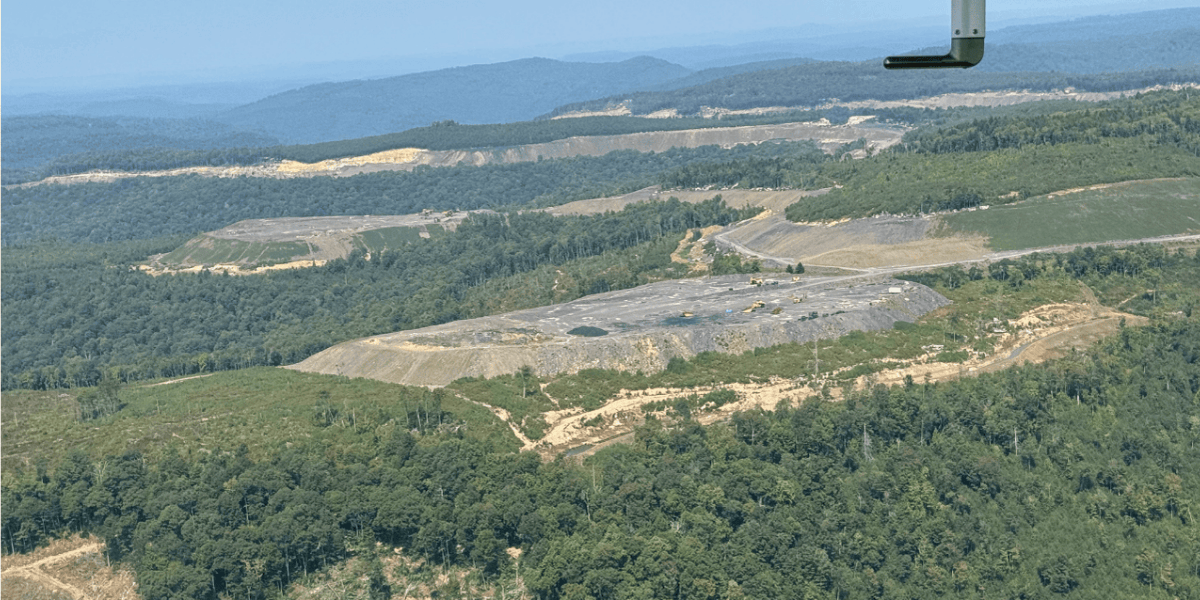The West Virginia Highlands Conservancy and Appalachian Voices sued South Fork Coal Company on Dec. 16, 2024 for ongoing violations of the federal Clean Water Act and Surface Mining Control and Reclamation Act at five coal mines in Greenbrier County, West Virginia. The groups are being represented by Appalachian Mountain Advocates based in Lewisburg, West Virginia.
The suit identifies numerous violations in which the company has continued to discharge pollutants into nearby waterways at levels exceeding legal limits. Despite these ongoing violations — some persisting for more than five years — the West Virginia Department of Environmental Protection has taken no effective action, allowing unlawful water contamination to continue unchecked.
Additionally, today’s filing points to South Fork Coal Company’s repeated failures to submit required water quality assessments to regulators or to clean up disturbed areas after coal extraction is complete. The company’s neglect of water quality and reclamation requirements puts the environment, local communities, and the budding eco-tourism economy of the area at risk.
The mines are adjacent to the Monongahela National Forest, about six miles from the popular Cranberry Glades Wilderness Area, and two miles from the Falls of Hills Creek Scenic Area, among other nearby ecotourism destinations.
The five mines — Lost Flats #1 and #2 Surface Mines, Blue Knob Surface Mine, Laurel Creek Contour #1 Mine, and Rocky Run Surface Mine — all discharge pollutants into the Laurel Creek Watershed and/or the South Fork of the Cherry River Watershed. Both streams feed into the Gauley River, an internationally renowned destination for whitewater rafting and kayaking. These waterways are also home to the endangered candy darter and are identified as trout streams by the state.
West Virginia Highlands Conservancy, Appalachian Voices, Greenbrier River Watershed Association, Kanawha Forest Coalition and the Sierra Club are already engaged in litigation with the U.S. Forest Service over the service’s issuance of road use authorization to South Fork Coal Company without following National Environmental Policy Act and Endangered Species Act requirements. Appalachian Voices is also suing the Office of Surface Mining Reclamation and Enforcement and the U.S. Fish and Wildlife Service over failures to enforce endangered species requirements on over 400 mines across the Appalachian region, including South Fork Coal Company’s operations. Attorneys with the Center for Biological Diversity are representing the conservation groups in both of those cases.
On Thursday, Dec. 12, 11 organizations sent a letter to Office of Surface Mining Reclamation and Enforcement Principal Deputy Director Sharon Buccino, urging the agency to take immediate action and shut down an illegal coal haul road operated by South Fork Coal Company across the Monongahela National Forest.
South Fork Coal’s operations have repeatedly violated permitted effluent limits for iron, manganese, aluminum, sediment and acid mine drainage, according to the company’s own monitoring reports. The company has exceeded the allowable effluent limit for manganese by as much as 994%, for aluminum by as much as 908%, for iron by as much as 189%, and for sediment by as much as 103%. When discharged into nearby rivers, streams or soil, coal effluent can harm ecosystems, contaminate drinking water sources and affect the health of both wildlife and humans. Sediment, in particular, threatens the endangered candy darter.
“We call on South Fork Coal Company to fulfill its clear legal obligations and halt the ongoing assault on our invaluable natural resources,” said Andrew Young, extractive industries committee chair for the West Virginia Highlands Conservancy. “These cherished landscapes — home to endangered species, pristine waterways, and resilient communities — are an American birthright to be protected in public trust, not a disposable commodity for King Coal’s profiteering. Access to clean water is a human right. Every day that these toxic discharges continue, people’s health is jeopardized, vital ecosystems suffer, and the rule of law is subverted. Such contempt for community well-being and environmental integrity is indefensible. We will continue to advocate for accountability and will never stop fighting for a reality where our people, wildlife, and waters are protected for generations to come.”
“South Fork Coal Company is running roughshod over these headwater streams of the Cherry and ultimately the Gauley River, showing no consideration for Richwood and other downstream communities that depend on these rivers for drinking water, recreation, spiritual grounding and as a lynchpin for their local economies,” said Willie Dodson, coal impacts program manager for Appalachian Voices. “The money people spend coming into this area to hike, kayak and fish is crucial for the new economy that local leaders and entrepreneurs are working so hard to build. By polluting the water and neglecting to clean up the gashes its strip mines have cut into the land, South Fork Coal Company is jeopardizing those efforts.”

